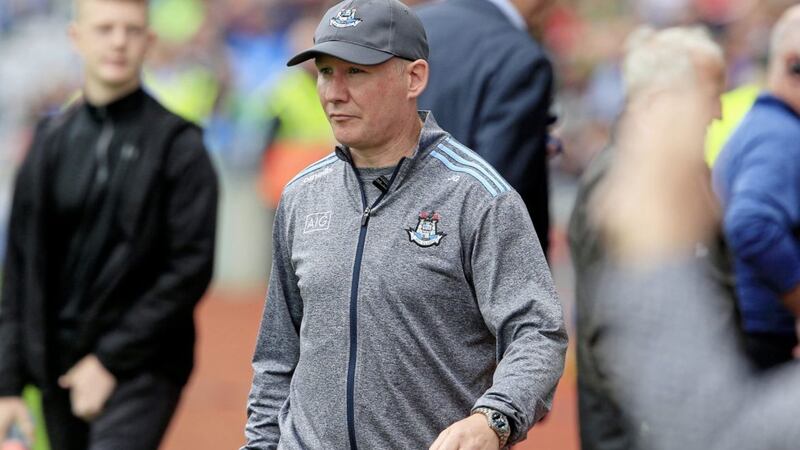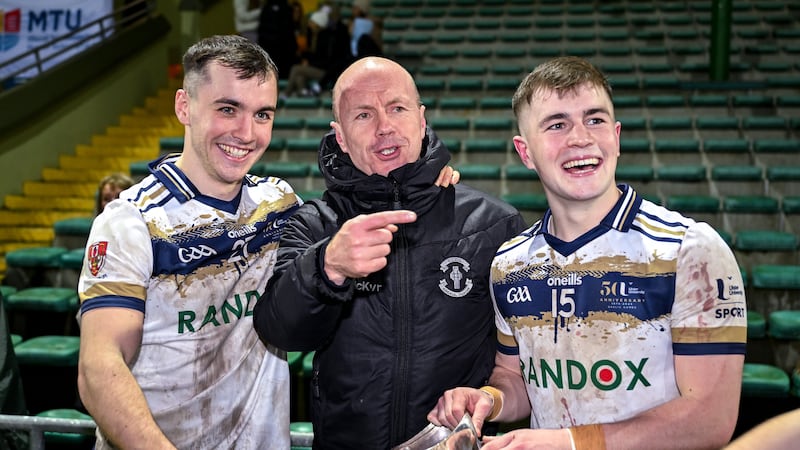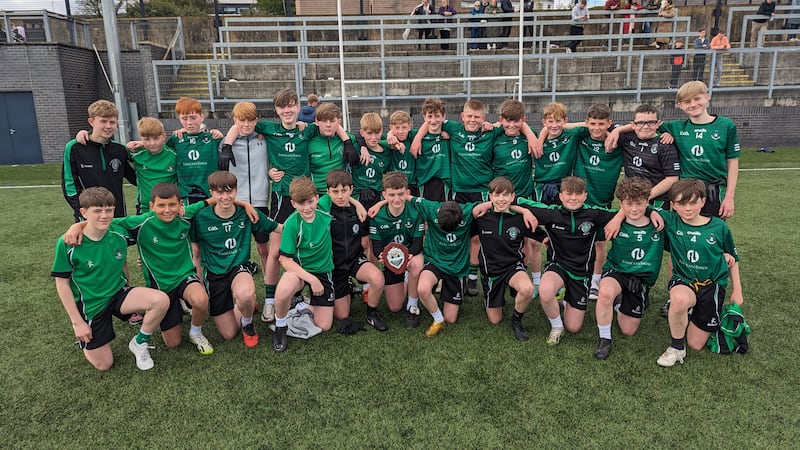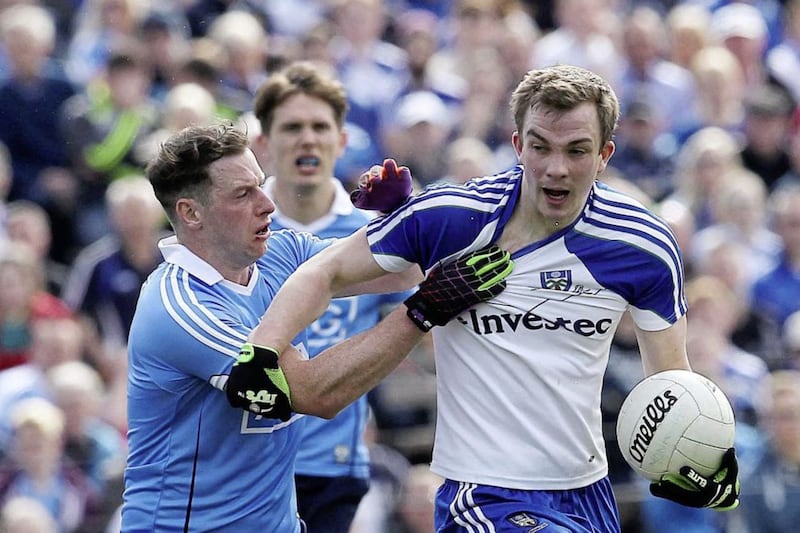THE Hogan Stand fence was between them but Philly McMahon and his parents were united in pride and joy after games.
Beaming smiles through the wire.
A kiss from his mum, a hug from his dad.
Four times they’d met after All-Ireland finals as the Hill swayed with the ‘Rare ’oul times’ and the Boys in Blues passed around the Sam Maguire.
But Belfast-born Phil senior, by then battling stomach cancer, wasn’t able to make it to the fence when Mayo were beaten by a point in 2017.
So Philly went to him.
“He normally came down to the fence at the Hogan Stand and I would run over to him and give him a hug. Over the years that was the ritual – hug me da and me mam,” explains Philly.
“But he couldn’t get down because he was too ill. So I jumped over the fence, we had beat Mayo and there was Mayo fans pulling out at me and getting their digs in at me.
“So I started climbing over the seats. There was a couple of them pulling out at me and I said: ‘Listen I’m getting up to me da there’ and a couple of Dublin fans were saying: ‘Leave him alone’ so I jumped up the seats and it was a special moment for me.
“I saw the energy I gave him that day, he was a fella that wasn’t going to last much longer on the planet and I saw the energy I gave him.”
Confirmation of Phil’s cancer had come through four months previously, in May 2017. He’d had stomach problems ever since a British Army bullet hit him in the stomach on the way home from a dance in west Belfast almost 40 years previously.
His father’s illness caused Philly – by then an absolutely integral part of Jim Gavin’s all-conquering Dublin team – to revaluate everything in his life, including football.
“When me dad got sick I was in a very difficult place,” he says.
“I didn’t want to play football. The year he got diagnosed I was thinking: ‘Right, I don’t want to be here’. I was going to training and I was making mistakes and I was like: ‘No, this is not for me, I don’t want to be here, I want to be with me da’.
“I was playing below my standards because I wasn’t training at the standards I needed to be training at. Physically I wasn’t at the levels I should have been at, mentally I certainly wasn’t at the right level.
“When I look back I can’t believe I was able to play. I played probably two seasons with a huge weight on my shoulders. It’s crazy to think about it.
“But at the same time the football certainly helped, I was very fortunate to have my team-mates around me. They were very supportive of my situation and especially the management who were always on to me making sure everything was alright.
“I’m very lucky to have that around me. There was times when I probably didn’t recognise it was helping me.
“Every bit of time I had, I wanted to spend it with my da. But then I looked at the more selfless side of it which was that he wanted me to play, he wanted me to win.
“All the stuff he had done for me from I was a kid to where I am now, if I had walked away then I would have let him down. All the time and the effort and the energy he put into me got me to where I was and that was the only thing that kept me there in 2017.”
With the support of Jim Gavin and his team-mates, McMahon hung in there. The following year, 2018, Tyrone were the opposition in the All-Ireland final.
Philly and Dublin won again, the Hill swayed with the ‘Rare Oul Times’ again and the Boys in Blue passed around the Sam Maguire again. But his father wasn’t there to share the moment with him. He had passed away on July 1st, 2018.
“When he passed I was in a bad, bad place and I said to myself: ‘Do you know what? He’d still want you to play’,”
On July 21, Philly travelled North with the team and returned to the Dublin ranks out against Tyrone in Omagh in the second round of ‘Super 8’ games. Fans of both counties gave him a memorable reception at Healy Park.
“I knew I could help the group to win an All-Ireland and that could give energy to someone in the stand or somebody in hospital,” he says.
“That’s what motivated me to keep going.”
Looking back, it’s highly unlikely that Philly would have played at Croke Park at all without the influence of his parents. Throughout his childhood both were a constant supporting force, first it was soccer and then at Ballymun Kickham’s.
“It’s hard to put into words how influential him and my mam were to my whole career,” explained the seven-time All-Ireland winner
“My dad would have constantly been at me: ‘Go out and practice your football’ he used to tell me to go out and kick the ball off the flats and practice my headers.
“My mam did the same. When we got a car she would have driven me everywhere and the amount of clothes she would have washed for me over the years! They were both so supportive of me and I was the spoiled child, the youngest, ‘golden balls’ they used to call me because I played football but my siblings where so supportive of me as well.
“My da was a huge influence. We used to walk down to Fairview for matches - and from Ballymun to Fairview is about a two-hour walk! Sometimes we’d get the bus down and if I played badly we’d walk back!
“But I don’t want it to come across that he was negative because he wasn’t.
“He just told me the way it was and as I got older I realised: ‘Jesus he’s the only person I had who was honest, who helped me’. As much as I didn’t like it as a young kid, look what it’s done for me, look where I am now.
“After each game he was my biggest critic all the time. Good and bad. When he said something good it meant: ‘Jesus, I must have done something right there’ but when I was bad he’d tell me and I miss the criticism.”
When Phil McMahon was diagnosed with cancer the family was told the end would come at Christmas. The Belfast Republican, who had fled to Dublin on the run after escaping from Newry Court House in 1975, lived until the following summer and every single moment of those precious last few months was special for the family.
“When you have a family member who’s terminally ill, it’s a different life you live,” Philly explained.
“It’s a terrible thing to go through but you love the person so much that it’s a really good place in a way.
“It’s unfortunate that you have to wait until you’re told: ‘This person is not going to live much longer’ before you actually start to spend quality time with them.
“When I first set my business up I would have worked from 6am until 8pm at night. I would have went home to visit my mam and dad but it would have been a token kind of visit. I would be thinking: ‘Oh, I haven’t seen them, I’d better go down’.
“My da was retired and he’d be sitting watching the telly all day and he’d tell me what was going on all day but I didn’t want to listen, I’d be on my phone like we all do.
“It’s a regret I have but I like to think that the year that we had with him was very special.”
He added: “It was nice to see over the year from he was diagnosed until he passed so many of his comrades come down to visit him.
“At one stage we had to stop it. He was getting fatigued because he was getting chemotherapy and he’d have three or four visits a week from people coming down from the North or from the States. It was amazing. It showed what type of person he was and how they felt about him.
“How you treat people is probably the biggest values he gave me. To be kind, that was his biggest thing; be kind.
“That’s coming from a guy who was tough, hard, who could fight, who came from the North, from the Troubles and he could do that. So I thought: ‘If he can do it anybody can do it’.”
Phil will be missed at Philly’s wedding in December and, sadly, he’s not the only family member who won’t be there on that special day. It’s seven years ago now since Philly’s brother John passed away.
Seven years his elder, John was given ‘H’ for the first time in a lift in the Ballymun flats when he was just 14-years-old. That first hit began a spiral into heroin addiction that led to his death in 2012.
“When John passed I was living a good life,” he says.
“I had challenged the standards of my culture: I didn’t drink alcohol, I didn’t take drugs, I didn’t commit crime, I didn’t end up in prison…
“I was working, I’d won my first All-Ireland in 2011 so when John passed I was kind of living in a bubble. When he passed away I started to reflect and try to understand life and death and it smashed the ceiling down really and since then I’ve gone after all the different components of my life in terms of sport in what I’ve won with Dublin, business has gone really well but more importantly how I understand people and the purpose I’ve developed in life to help high-risk youths and drug addicts.
“I wouldn’t be able to do that unless I had John’s passing to ignite that purpose within me.
“I travel around the country and speak to sports clubs, charities, schools and companies and I tell people: ‘Don’t wait ’til it happens, don’t wait until someone is terminally ill or passes away until you live life because you don’t know when you’re time is up’.”
Determined to use the experience of losing his brother to help other vulnerable people, Philly has devoted himself to making a difference in the Ballymun community. His profile as a member of arguably the greatest team ever to play Gaelic Football has made him a role model and even though he modestly dismisses his work as – “something that I’m capable of doing, so I do it” – you can’t help but shake your head in admiration as he explains: “When you’re dead and gone that’s what you’ll be remembered for.
“It’s not really about the numbers in your bank account, or what businesses you have, or how many All-Ireland medals you have.
“When you’re dead and gone what do you want to be remembered for? For me it’s energy. Who did you give energy to? I’m very fortunate that I have a company that does that through health and fitness.
“I have a purpose in life to target high-risk youths and drug addicts through early intervention in my local community. Half-Time Talk is my charity to help youths who slip through that early intervention net and then, if you slip through that net and you hit Mountjoy Prison, I’m trying to develop a programme called the Unfucccked Movement (the three c’s stand for ‘Culture, change and community’) and within that there is a leadership programme to help change the culture in the prison which helps prisoners when they reintegrate into society to change and impact their communities by using their mistakes and stories to help younger people.
“So it’s a kind of movement. I’m very fortunate to have that. Sport won’t last forever for me, I put 40-hours plus a week into football so when I get the chance to spend that time with loved ones and on my business and the social side of things it’s going to be a good journey to be on.
“For me, my dad was a hero. He had the belief within himself to fight for a cause and I’m doing something, not as powerful as he did, but my cause is my community and also to challenge the cycle my brother John went through in terms of drug addiction.
“My father went through the same process in terms of the hardship he went through so that’s what I took from him as a hero of mine.”
Isn’t it incredible to think that Phil McMahon was shot in Belfast at 16, joined the IRA, was imprisoned, escaped his cell, went on the run, lived in exile in Ballymun and brought up a lad who became an All-Ireland winner for Dublin and, more importantly, a role model for the vulnerable and a voice for the downtrodden?
Yes, it’s an incredible story.








